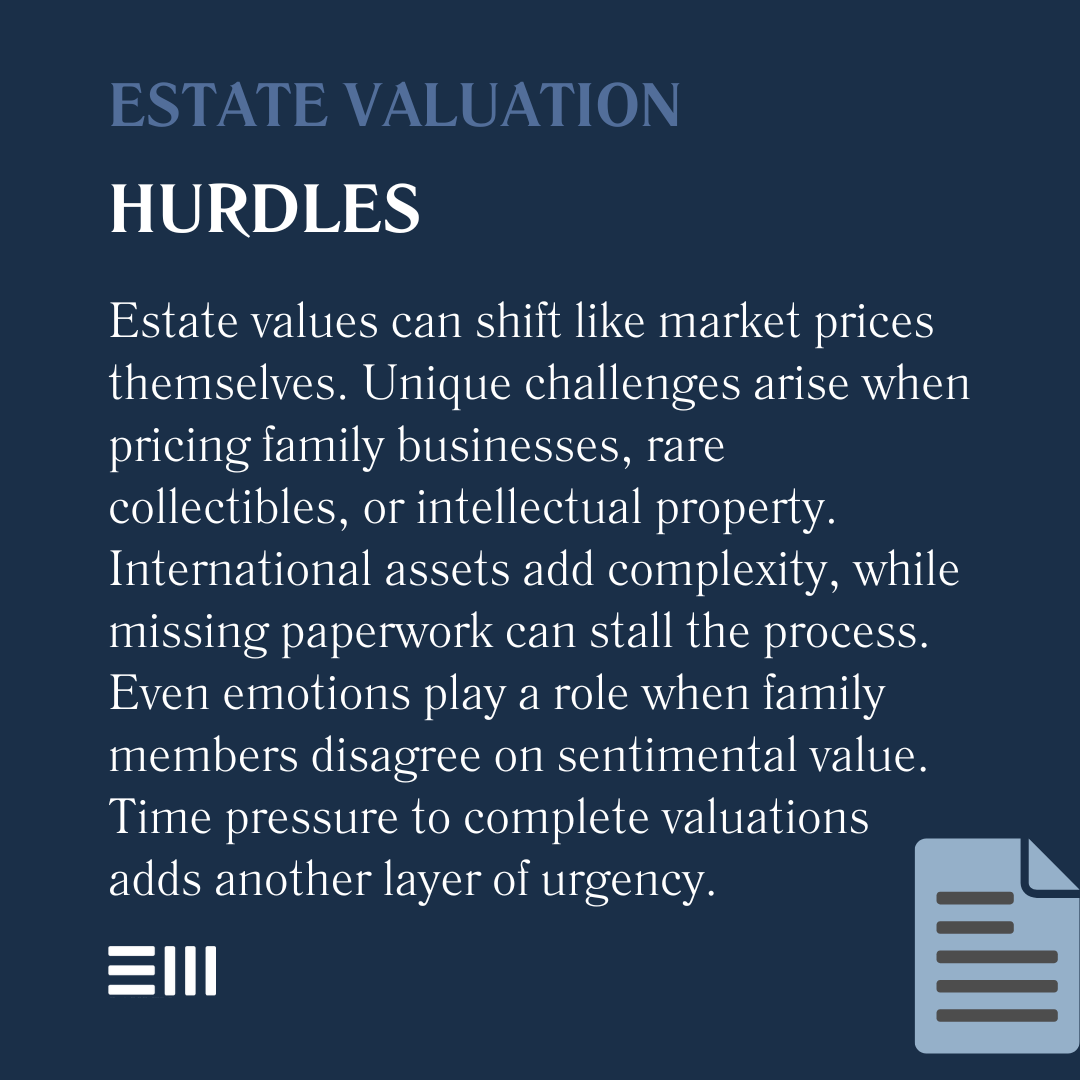Behind every family heirloom, investment account, and piece of property lies a story—and a value that must be carefully determined during Alabama probate.
From vintage collections tucked away in attics to complex business holdings, accurate valuation shapes not just tax obligations but family relationships for generations to come.
While some assets seem straightforward to assess, others harbor hidden complexities that can dramatically impact an estate's true worth.
The rise of digital assets and online investments has added new layers of complexity to this already challenging process, making professional guidance more valuable than ever.
Understanding Estate Valuation in Alabama
Estate valuation involves more than simply adding up bank account balances. Modern estates often contain diverse assets ranging from traditional real estate to cryptocurrency, requiring specialized knowledge and careful documentation.
Professional valuation helps ensure fair treatment for heirs while satisfying court requirements and tax obligations. The emergence of new asset classes and changing market conditions make staying current with valuation methods increasingly important for estate administrators.
Types of Assets to Inventory
Every estate contains different types of assets, each requiring specific valuation methods. A thorough understanding of asset categories helps ensure nothing is overlooked during the inventory process.
Common estate assets include:
- Real estate properties and land holdings;
- Vehicles, boats, and recreational equipment;
- Bank accounts and certificates of deposit;
- Investment portfolios and retirement accounts;
- Life insurance policies and annuities;
- Business interests and partnerships;
- Personal property and collectibles;
- Digital assets and cryptocurrencies;
- Intellectual property rights; and
- Agricultural equipment and livestock.
Understanding these categories helps create a comprehensive inventory that meets legal requirements.
Regular review and updates of the inventory ensure all assets are properly accounted for throughout the probate process. Professional assistance can help identify often-overlooked assets that might otherwise escape notice during initial inventories.
Valuation Methods
Different assets require different approaches to determine their fair market value. Choosing the right method ensures accurate valuation for probate purposes.
Common valuation approaches include:
- Professional appraisals for real estate;
- Market analysis for investments;
- Specialized assessments for businesses;
- Comparative sales for collectibles;
- Professional dealers for vehicles;
- Expert evaluation for artwork;
- Certified appraisals for jewelry;
- Business valuations for partnerships;
- Digital asset assessment tools; and
- Agricultural property expertise.
Each method requires careful documentation to support the assigned values. The choice of valuation method can significantly impact the final estate value, making it crucial to select appropriate approaches for each asset type.
Professional appraisers and valuation experts can help determine the most suitable methods for complex or unusual assets.
Required Documentation
Proper documentation forms the foundation of estate valuation. Understanding necessary paperwork helps streamline the probate process.
Essential documentation includes:
- Professional appraisal reports;
- Recent tax assessments;
- Bank and investment statements;
- Business financial records;
- Insurance policy documents;
- Vehicle titles and registrations;
- Property deeds and surveys;
- Digital asset access records;
- Professional certifications; and
- Inventory photographs.
These records support valuations and help prevent future disputes.
Frequently Asked Questions About Estate Valuation in Alabama
Estate valuation raises numerous questions for Alabama families navigating probate.
Here are answers to common concerns about the process.
How Are Personal Items Valued for Probate?
Personal items require careful assessment, often through professional appraisals for valuable pieces and reasonable estimates for everyday items.
When Should Property Be Appraised?
Property should be valued as close to the date of death as possible, though some circumstances may require alternate valuation dates.
What About Digital Assets and Cryptocurrencies?
Digital assets require specialized valuation approaches, often involving technical expertise to assess current market values.
How Are Business Interests Valued?
Business valuations consider multiple factors including assets, earnings, market conditions, and future growth potential.
Professional business appraisers typically employ several methods, such as asset-based approaches, market comparisons, and income capitalization. The complexity of business valuation often requires specialized expertise to ensure accurate results.
Do All Assets Need Professional Appraisal?
While not all assets require professional appraisal, valuable or complex items benefit from expert assessment.
Understanding these aspects helps ensure proper valuation throughout the probate process. Professional guidance can help navigate complex valuation scenarios and ensure compliance with legal requirements.
Regular consultation with estate administration experts helps avoid common pitfalls and ensures accurate asset valuation.
Common Valuation Challenges
Estate valuation often presents unique challenges that require careful consideration. Recognizing potential issues helps administrators prepare appropriate solutions.
Notable challenges include:
- Fluctuating market values;
- Hard-to-value collectibles;
- Family business interests;
- Restricted stock holdings;
- Intellectual property rights;
- International assets;
- Disputed ownership claims;
- Missing documentation;
- Sentimental value conflicts; and
- Time-sensitive valuations.
Addressing these challenges early helps prevent delays and disputes during probate. Professional guidance can provide solutions to complex valuation issues while ensuring compliance with legal requirements.
Regular communication with all interested parties helps maintain transparency and reduce the likelihood of disagreements over asset values.
Special Considerations for Alabama Estates
Alabama law contains specific requirements for estate valuation and inventory. Understanding these local requirements ensures compliance throughout the probate process.
Key considerations include:
- Filing deadlines for inventories;
- Required forms and documentation;
- Local court preferences;
- State tax implications;
- Property assessment rules;
- Business valuation standards;
- Digital asset regulations;
- Appraisal requirements;
- Inventory updates; and
- Record retention rules.
Following these guidelines helps ensure smooth probate administration. Regular consultation with legal professionals can help navigate complex valuation requirements while maintaining compliance with state law.
Understanding and following Alabama's specific requirements helps prevent delays and complications during the probate process.
Get Professional Guidance for Your Estate Valuation
Complex estates deserve experienced handling to ensure accurate valuation and proper inventory.
Our team provides comprehensive support throughout the estate administration process, helping protect your interests and ensure compliance with Alabama law.
With decades of experience in estate valuation and probate administration, we offer the expertise needed to handle even the most complex estates.
Contact us today for personalized guidance on your estate valuation needs. Let our experienced team help you navigate the complexities of estate inventory and valuation with confidence.


